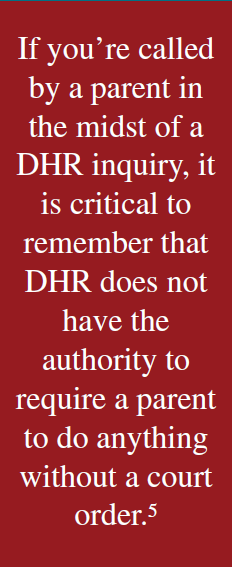Juvenile Court Evidentiary and Procedural Potential Pitfalls
| Jurisdiction | Alabama,United States |
| Citation | Vol. 82 No. 1 Pg. 0041 |
| Pages | 0041 |
| Publication year | 2021 |
By Gary L. Blume and Ronald W. Smith

"I'm not strange, weird, off, nor crazy. My reality is just different than yours."
-The Cheshire Cat1
Many lawyers who rarely find themselves representing accused, abused, or neglected children or their family members in juvenile court often feel as if they've "gone down the rabbit hole." Terms and concepts are different. Evidentiary standards vary depending upon the stage of the proceeding. In this article, we'll examine the highlights of both dependency and delinquency cases.2
Dependency Practice
Prior to Filing of Dependency Petition
Child abuse or neglect cases typically arise as a result of an investigation by a social worker from the Department of Human Resources (DHR) in response to a complaint that may have come from a concerned relative, teacher, neighbor, estranged former partner, or busybody. The social worker will often represent that she/he has broad powers to remove children and place them with another relative or close friend under what is referred to as a safety plan.3 Parents and others involved often think that they've been provided with an enforceable court order. Rather, they've signed a hand-written, fill-in-the-blank agreement that is effective only for 90 days.4 If you're called by a parent in the midst of a DHR inquiry, it is critical to remember that DHR does not have the authority to require a parent to do anything without a court order.5 Make them go to court and prove their case.

Emergency Removal from the Custody of a Parent
A child may be summarily removed in an extreme situation, if a law enforcement officer has "reasonable grounds" to believe that a child is in imminent danger and the removal of the child is necessary for the protection of the child's health and safety, or if there's no parent or other suitable person able to provide for the child.6 The child is then placed temporarily in DHR foster care, and DHR must file a depend c ency petition.
After the Filing of a Dependency Petition-The Shelter Care Hearing
There must be a hearing within 72 hours when a child has been summarily removed from a parent's custody.7 This is referred to as a shelter care hearing. If a parent can be found, he/she must be provided with written or verbal notice of the date, time, place, and purpose of the shelter care hearing.8 During the shelter care hearing, "[a]ll relevant and material evidence helpful in determining the need for shelter may be admitted by the juvenile court, even though not admissible in subsequent hearings."9 In other words, hearsay and other generally inadmissible evidence will be considered during the shelter care hearing. Don't be surprised if even unqualified speculation regarding what an expert may later conclude about a child's situation comes to light during the shelter care hearing. That is a bell that is extremely difficult to un-ring.
All dependency hearings are conducted without a jury and separate from other proceedings. The general public is excluded. Usually, only the parties, their counsel, witnesses, and the DHR social worker present. Other persons the court finds to have a proper interest in the case or in the work of the court may be present. If the juvenile court finds that it is in the best interests of the child, the child may be excluded from the hearing.10
A parent's attorney should become as thoroughly acquainted with the facts and circumstances of the case as possible before a shelter care hearing. The parent's attorney needs to know about the parent-warts and all. Remember, from an evidentiary point of view just about everything negative about your client can and will come in during the shelter care hearing. Since the same judge will normally preside over the later adjudicatory trial, a parent's attorney may consider it worthwhile to avoid the judge hearing the worst about the parent at this stage. A stipulation at the shelter care hearing is not binding upon the parent at subsequent proceedings.11
At the conclusion of the shelter care hearing, the juvenile court shall immediately release the child to the care, custody, and control of the parent/legal guardian/legal custodian or another suitable person, unless the court finds that the child has no parent/legal guardian/legal custodian or other suitable person able to provide supervision and care for the child, or that the release of the child would present a serious threat of substantial harm to the child.12 The juvenile court's decision must be supported by clear and convincing evidence if it determines not to release the child.13
If the juvenile court returns the child to the parent at the conclusion of the shelter care hearing, the court may impose a variety of conditions, including, but not limited to, restrictions on travel, associations, or living conditions of the child, pending the adjudicatory trial.14
Finally, a shelter care order in which the juvenile court finds dependency, is an order that "addresses crucial issues that could result in depriving a parent of the fundamental right to the care and custody of his or her child" and is an appealable order.15
Pre-Adjudicatory Orders, etc.
The juvenile court may direct DHR to prepare a report with recommendations concerning the child, the family, the home environment, and other matters relevant to the need for treatment or disposition of the case.16 If there are indications that the child may be physically ill, mentally ill, intellectually disabled, developmentally delayed, or has other special needs, the juvenile court, on its own motion or motion of a party, may order the child to be examined by a physician, psychiatrist, psychologist, etc. and require a written report prior to the adjudicatory trial.17
Counsel should be aware that if there are allegations of abuse or neglect, DHR may investigate the accusations independently from the juvenile court proceedings in order to enter its findings in the Central Registry for Child Abuse and Neglect (CA/N Registry).18 The scope of DHR's investigation by its social worker can be extremely broad and is left up to DHR's discretion.19 DHR will either enter a finding of "indicated" or "not indicated." An indicated finding means that the DHR social worker found that credible evidence and professional judgment substantiates that the alleged perpetrator was responsible for child abuse or neglect.20 A not indicated finding means that the DHR social worker did not find sufficient credible evidence to support the worker concluding that the parent was responsible for child abuse or neglect.21 The parent has the limited due process rights typical of administrative reviews.22
In the event of such reports, counsel should be prepared for DHR to seek to introduce their reports and findings at the adjudicatory trial, either directly or indirectly.
Adjudicatory Trial
Although § 12-15-310 refers to this stage of a dependency case as an adjudicatory hearing, make no mistake, this is a trial. For a parent facing loss of custody of her child, the importance of the proceeding should not be vitiated by any lesser verbiage. Nevertheless, in many jurisdictions, often the court, DHR, and sometimes the child's guardian ad litem (GAL) work to expedite the process. Sometimes, there's an attempt to proceed to entry of an adjudication of dependency without testimony or other evidence of record. Alabama appellate courts will reverse such cases.23
Section 12-15-310 prescribes the manner in which a dependency adjudicatory trial is conducted, explicitly requiring proof by clear and convincing evidence.24 Rule 1(A) of the Alabama Rules of Juvenile Procedure provides that "the Alabama Rules of Evidence shall apply in all proceedings in the juvenile courts."25
Counsel should be mindful of the express language in § 12-15-310(c) allowing a third party to testify about a written or verbal statement made by a child under...
To continue reading
Request your trial
